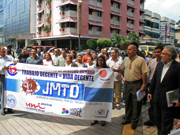Decent Work, Decent Life for Women

Spanish: ![]()
On March 8 we are celebrating our solidarity with women around the world. And as we do so, we must particularly remember those living in conflict and in poverty, those whose rights are violated daily.
We should also reflect on where we stand, how far we have progressed and what we still need to do to achieve those rights and opportunities that are integral parts of women’s rights as workers and citizens. Women's rights are human rights.
Gender equality goes hand in hand with democracy, at all levels. Freedom from discrimination is the cornerstone of democracy.
But democracy requires more than an absence of discrimination. It also means sharing the power to make decisions, in politics, in economic and social life, in unions and in the home.
The barriers women face are complex and structural. Women continue to shoulder the bulk of the responsibility for caring for children and elderly relatives. The reconciliation of work and family life, which is so much talked about, is still mainly regarded as a woman's problem. Also, women are still paid between 16 and 60% less than men for their work and they are concentrated in low-paid, temporary, casual or unprotected jobs.
Similar differences are found if we look at the position of women in decision-making, including in trade unions. Despite the progress of recent years, the gender imbalance is still important. A balanced presence of women and men would make a difference and influence decisions to reflect a wider range of concerns and take account of the priorities of the whole of society, not just half of it. And because of that, it is more likely that the decisions would have a positive impact in practice.
On this year’s International Women's Day, ITUC and the Global Union Federations, including UNI, are launching a two-year global campaign for Decent Work, Decent Life for Women.
The key objectives of this campaign are:
- To advocate decent work for women and gender equality in labour policies and agreements;
- To seek gender equality in trade union structures, policies and activities and a significant increase in the number of women trade union members and women in elected positions.
The activities will focus on sectors or areas of work where women workers are most vulnerable, such as export processing zones, domestic work, in part-time and precarious employment, migrant workers and in the informal economy.
After 8 March the next key dates for action will be:
- The World Day for Decent Work on 7 October 2008 and
- the UN Day for the Elimination of Violence against Women on 25 November, running until the UN Human Rights Day on 10 December.
UNI therefore again calls upon all its affiliates to strongly campaign for women’s rights and continue organising women into trade unions, particularly those working in new sectors and in precarious forms of employment, as well as migrants.
Please send your messages for the International Women’s Day and information on any activities you are organizing to: women@uniglobalunion.org so that we can post them on our website.
The three UNI “Stop violence” posters can be downloaded from this website and wristbands can be ordered by writing to women@uniglobalunion.org
Links:
Campaign Guide: http://www.ituc-csi.org/IMG/pdf/ITUC_Campaign_Guide_08_ENG.pdf
ITUC Report on the Global Gender Pay Gap released on 7.3.2008: http://www.ituc-csi.org/IMG/pdf/gap-1.pdf

